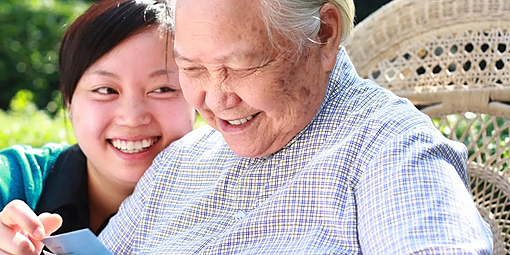You are just heading out the door to catch the bus to work when the phone rings. It’s your 75-year-old mother calling to let you know she’d suffered a dizzy spell, fallen, and broken her leg. Fortunately a Good Samaritan escorted her to the hospital but she’s worried about how she is going to manage once she gets back home. What you’ve been dreading has now happened. You’ve been concerned about her living alone for several years now, ever since your father died, but have done nothing about it. Your mother lives five hours away by car and your only other sibling lives half way around the world. Somehow you are going to have to make arrangements for her short-term and long-term care and you have no clue where to begin.
Caregiving by its nature is not usually something that can be added on top of your daily activities in a neat, stress-free package. It must be integrated with your many other responsibilities, and for that you must acquire new knowledge and a different set of skills.
As a starting point, it is important to recognize that each situation is different. You will need to learn as much as you can about your loved ones’ circumstances and requirements, so that you can take clear, decisive action when necessary. Whether you’re planning ahead or on the fly, it’s essential to determine exactly where and how you, as a caregiver, fit in. You need to understand your strengths and weaknesses, what other family members will contribute, and what resources you’ll need to be able to manage the eldercare situation, your own family, and your job successfully.
It used to be that caregivers received little help or recognition in the workplace. While there’s still more learning and work to be done, the good news for those facing caregiving today is that:
Employers coast to coast are beginning to recognize the challenges of eldercare, the risks of caregiver burnout, and the impact on productivity at the workplace. Employers are much more supportive and many provide educational materials and programs to help ease the burden.
Our governments have also recognized the value and importance of family caregivers and have prioritized the introduction of programs like caregiver leave, tax credits, and health promotion and prevention programs for Canadians.
Prepare in advance
If we know a time will come when we have caregiving responsibilities for an elderly person, then the more we do in advance to prepare, the easier it will be for everyone concerned. Here are some things you can do in advance to prepare for a time when you may need to intervene:
- Talk with your employer. Find out what the caregiver policies are and what options might be available should you need them. Would they consider staggered hours, job sharing, a shorter work week, a temporary leave of absence, or the option to work from home?
- Get educated. Ask professionals for advice and assistance; you will get the information and support you need more rapidly and accurately. Read relevant books and magazines and attend educational sessions for workers with aging relatives.
- Have the paperwork in order. Arrange to have power of attorney for personal care and property, as well as wills (including wishes for end-of-life care), financial information, keys, and contact information for friends and family readily available. You should also have a record of your parents’ Social Insurance Numbers, medical insurance numbers, and contact information for medical insurance providers.
- Home safety. Consider having a safety assessment of your loved one’s home by a trained health professional.
- Keep track of medications. Keep a record of all medications and encourage use of the same pharmacy for all prescriptions. Watch for drug interactions and compliance-related issues.
- Be vigilant. Monitor your parents’ situation by watching for subtle changes in their mental, physical, and emotional health.
- Be prepared. Agree on the responsibilities for family members and friends if an emergency occurs.
- Contact your EFAP. Find out what services are available through your Employee and Family Assistance Program and use them.
References:
- Being a healthy caregiver. Alzheimer’s Association. Retrieved October 1, 2018 from: https://www.alz.org/care/alzheimers-dementia-healthy-caregiver.asp.
- Caring for the caregiver. National Cancer Institute. Retrieved October 1, 2018 from: https://www.cancer.gov/publications/patient-education/caring-for-the-caregiver.
- Caregiver stress. U.S. Department of Health and Human Services. Retrieved October 1, 2018 from: https://www.womenshealth.gov/a-z-topics/caregiver-stress.













